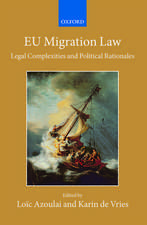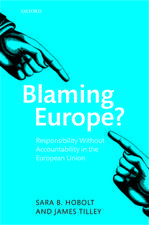The European Union, the United Nations, and the Revival of Confederal Governance: Global Perspectives in History and Politics
Autor Frederick Listeren Limba Engleză Hardback – 10 iul 1996 – vârsta până la 17 ani
Din seria Global Perspectives in History and Politics
- 27%
 Preț: 507.32 lei
Preț: 507.32 lei - 30%
 Preț: 506.67 lei
Preț: 506.67 lei - 30%
 Preț: 590.63 lei
Preț: 590.63 lei - 28%
 Preț: 461.11 lei
Preț: 461.11 lei - 28%
 Preț: 462.45 lei
Preț: 462.45 lei - 35%
 Preț: 461.43 lei
Preț: 461.43 lei - 27%
 Preț: 438.67 lei
Preț: 438.67 lei - 28%
 Preț: 462.37 lei
Preț: 462.37 lei - 28%
 Preț: 436.04 lei
Preț: 436.04 lei - 38%
 Preț: 436.99 lei
Preț: 436.99 lei - 28%
 Preț: 438.00 lei
Preț: 438.00 lei - 50%
 Preț: 305.89 lei
Preț: 305.89 lei - 35%
 Preț: 362.79 lei
Preț: 362.79 lei - 24%
 Preț: 361.45 lei
Preț: 361.45 lei - 27%
 Preț: 682.14 lei
Preț: 682.14 lei - 27%
 Preț: 440.44 lei
Preț: 440.44 lei - 27%
 Preț: 345.42 lei
Preț: 345.42 lei - 18%
 Preț: 319.38 lei
Preț: 319.38 lei - 52%
 Preț: 251.14 lei
Preț: 251.14 lei - 33%
 Preț: 319.64 lei
Preț: 319.64 lei - 38%
 Preț: 439.69 lei
Preț: 439.69 lei - 38%
 Preț: 344.58 lei
Preț: 344.58 lei - 51%
 Preț: 302.86 lei
Preț: 302.86 lei - 38%
 Preț: 440.44 lei
Preț: 440.44 lei
Preț: 436.04 lei
Preț vechi: 603.21 lei
-28% Nou
Puncte Express: 654
Preț estimativ în valută:
83.45€ • 86.79$ • 69.83£
83.45€ • 86.79$ • 69.83£
Carte tipărită la comandă
Livrare economică 15-29 martie
Preluare comenzi: 021 569.72.76
Specificații
ISBN-13: 9780313298905
ISBN-10: 0313298904
Pagini: 200
Dimensiuni: 156 x 235 x 20 mm
Greutate: 0.43 kg
Editura: Bloomsbury Publishing
Colecția Praeger
Seria Global Perspectives in History and Politics
Locul publicării:New York, United States
ISBN-10: 0313298904
Pagini: 200
Dimensiuni: 156 x 235 x 20 mm
Greutate: 0.43 kg
Editura: Bloomsbury Publishing
Colecția Praeger
Seria Global Perspectives in History and Politics
Locul publicării:New York, United States
Notă biografică
FREDERICK K. LISTER is a veteran of 34 years of service in the UN Secretariat where he helped to coordinate the many interlocking activities of the UN and its 15 specialized agencies. In his retirement, he has engaged in research on international organizations as a senior research fellow of the Ralph Bunche Institute at CUNY.
Cuprins
Foreword by Benjamin RivlinPrefaceThe Opening ArgumentThe Nature of Confederal GovernanceThe European Union: Jumbo ConfederationThe United Nations: A Collective Security Confederation in the MakingThe Closing ArgumentSelected BibliographyIndex













